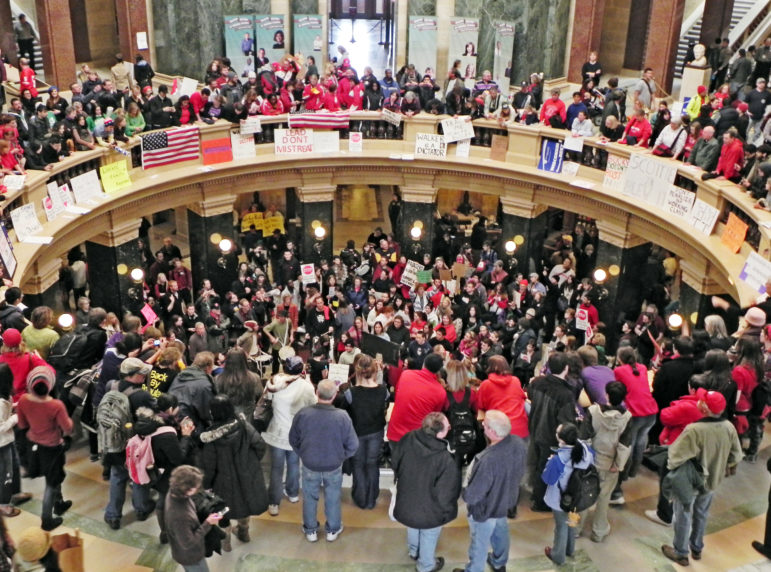The Incredible Decline of Wisconsin Unions
Once one of leading states for unions, now well behind the nation.

Union workers, teachers and others protesting Act 10. Photo by Richard Hurd. (CC BY 2.0)
A new study finds that union membership in the United States continues to decline and now stands at just 10.3 percent, compared to 24 percent in 1979. Wisconsin has declined even faster, and is now well below the national average, with just 8.1 percent of its workers belonging to unions.
Wisconsin had always been a leading state for unions, because it ranks second in the percent of workers employed in manufacturing (which had long been the sector with the most unionized workers) and because it was the first to allow public workers to collectively bargain. A quarter century ago, in 1983, 24.6 percent of workers in Wisconsin were unionized, at time when the national average had dropped to 18 percent.
Few if any states have seen their percent of union jobs decline as drastically since then. The threat of outsourcing jobs to Mexico and then China helped many of the state’s manufacturers undermine the power of unions, and a series of anti-union bills championed by Republican Gov. Scott Walker has crushed both public and private sector unions in Wisconsin.
The new report by the publication Construction Coverage analyzed union membership and coverage data from the U.S. Bureau of Labor Statistics and UnionStats.com. and found huge differences between states in the percent of workers who are unionized. “Coastal states such as Hawaii, New York, and Washington have the highest membership rates, at 23.4 percent, 21 percent, and 18.8 percent, respectively. Conversely, more conservative Southern states, such as North Carolina, South Carolina, Virginia, Texas, and Georgia, have membership rates below 5 percent,” the report found.
Government is now by the far the most unionized sector, the report found, with about 34 percent of workers belonging to a union. Other sectors with higher-than-average union membership rates include transportation and utilities (about 17 percent), and construction (about 13 percent). By contrast, less than five percent of employees who work in finance, professional services, leisure and wholesale/retail trade belong to a union.
The report notes that many of the fastest-growing industries, according to the U. S. Bureau of Labor Statistics, are those with low rates of union participation, such as home health care, outpatient car centers, computer services and warehousing and storage.
Another factor has been the passage of right-to-work laws that make it very difficult to create unions. Until recently these laws had been concentrated in the nation’s southern, Great Plains and Rocky Mountain states, but in recent years several Midwestern states have passed such laws, including Indiana (passed in 2012), Michigan (2012) and Wisconsin (2015).
Walker had run for his first term in 2010 with the support of private unions like Local 139, a statewide union of 9,000 heavy machinery operators, because he promised to increase highway funding and build more roads. When he ran for reelection in 2014 Walker promised Terry McGowan, the president of Local 139, that a right-to-work law would never pass in Wisconsin. And so the union again supported him, and just four months after his reelection, he signed a right-to-work law. (For that matter he failed to spend on highways and roads as promised.)
A powerful 2018 report by four economists documented how unions have been a huge factor in reducing income inequality in America, and not just for union members. The decline of unions is a key reason the United States now has the biggest wealth gap in at least a century between the super-rich and everyone else.
Walker’s Act 10 law left most public workers in the state without union representation and took $3 billion from the pockets of these mostly middle class workers, who were required to pay more for their benefits. The Right to Work law has helped reduce the numbers of private sector union workers while reducing their average wage, as has happened in other states.
Other bills passed by Walker and the Republicans have also had a negative impact on unions and workers:
–Repealing the 2009 Equal Pay Enforcement Act, which made it easier for women workers victimized by wage discrimination to seek remedies.
–Repealing a law that said employees must have at least one day of rest every seven days.
–Repealing the “living wage” law, which gave workers the option to demand better pay — as much as $6,000 annually — than the minimum wage.
–Ending prevailing wage requirements by local governments.
–Ending project labor agreements by local governments, which require the use of union workers for public works projects.
The repeated assault on unions and worker rights may help explain the reduction in average wages paid by manufacturers in recent years and the fact that that Wisconsin now has the greatest level of income inequality since 1929. It’s a stunning turnaround for a state that was once one of the most pro-worker and pro-union states in America.
If you think stories like this are important, become a member of Urban Milwaukee and help support real, independent journalism. Plus you get some cool added benefits.
Murphy's Law
-
Top Health Care Exec Paid $25.7 Million
 Dec 16th, 2025 by Bruce Murphy
Dec 16th, 2025 by Bruce Murphy
-
Milwaukee Mayor’s Power in Decline?
 Dec 10th, 2025 by Bruce Murphy
Dec 10th, 2025 by Bruce Murphy
-
Total Cost of Foxconn Is Rising
 Dec 8th, 2025 by Bruce Murphy
Dec 8th, 2025 by Bruce Murphy






















Excellent report on unions or lack thereof and the effects!
Chris Christie
Much like our current President, Walker was able to have good people vote against their best interests.
Much like the current President, Scott Walker was able to get good people to vote against their best interests. Sad…
I am always amazed at union workers who vote for politicians like Scott Walker and wonder why they have lost their bargaining power and end up with fewer benefits and lower pay.
Andrew, how is that you’ve acquired such a low opinion of “good people” as to declare that they would “vote against their best interests”..multiple times, no less, over a period of several years? I’m always puzzled when I hear that claim. Could it be that “their best interests” (in their own minds and hearts) include more/different “interests” than you ascribe to them? OR, possibly, that whomever professes to represent “their best interests” is simply (a) not believable, (b) perceived as corrupt or incompetent, (c) thought to simply represent “more of the same” despite their “sell by” date being past?
Maybe some significant number of people are just “turned off” by the thought of being “represented by a Union”, Maybe it’s just not part of their DNA, or maybe they’ve heard bad stuff about some union leaders’ antics, or maybe they aren’t cool with unions using their dues to support poliotical candidates they don’t like.
Anyway, show me a group whom you suspect are open to voting “against their best interests”. I’d like to invite them to a seminar where I suggest moving their savings and 401k’s into a very low-risk venture seeking gold bars from barge that may have sunk in Lake Winnebago waters off Menasha. Something tells me a few would feel that’s not in their best interest. But the ones that go for it, those are your confused good people who’d be snookered to choose what’s not in their best interest all things considered..
I always find it interesting that persons who do not want to be represented by a union are always quite eager to take the wage increases and the worker protections that the unions negotiate.